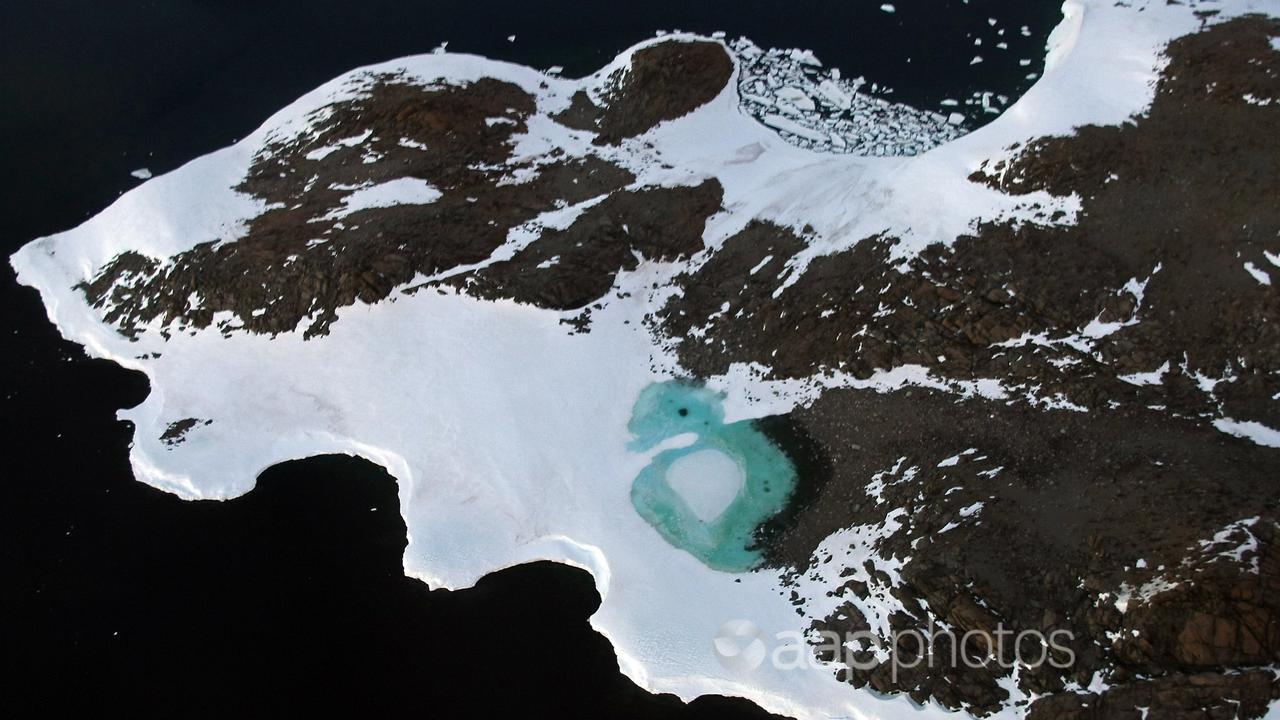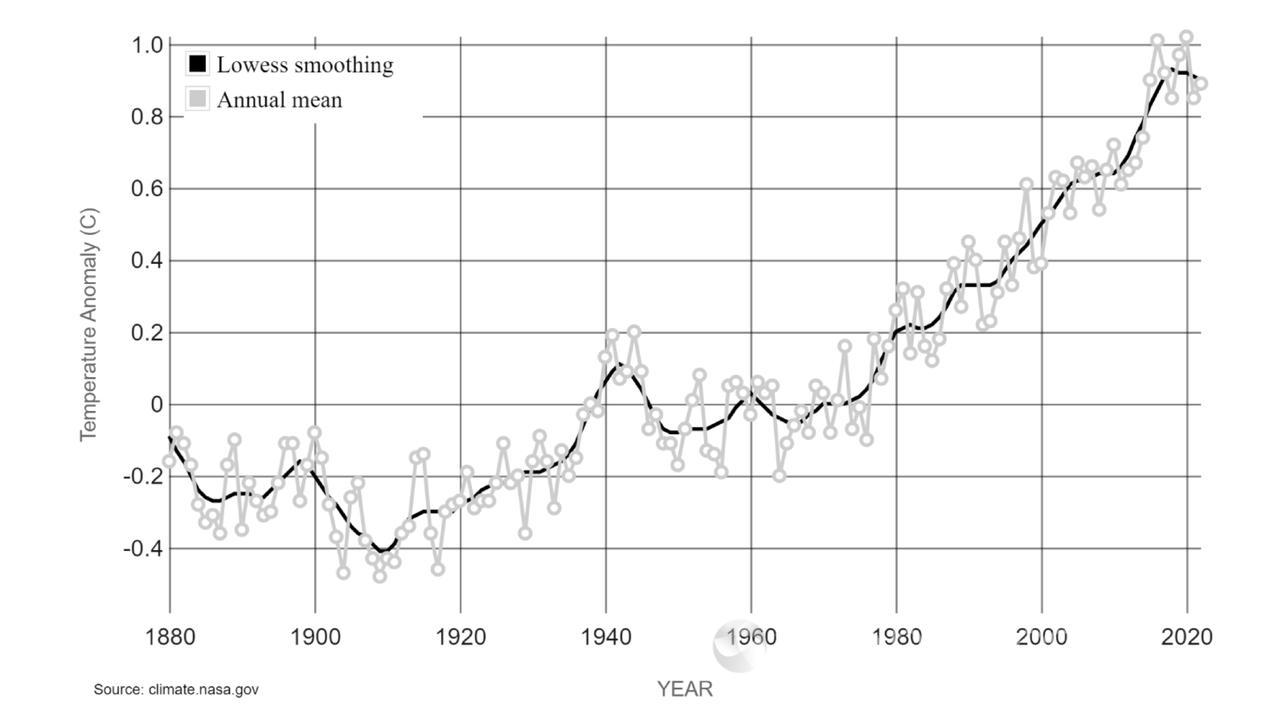A social media post argues “climate change” used to be called “anthropogenic global warming”, but was replaced because the earth hasn’t warmed as scientists predicted.
The claim is false, in both the history of the terminology and the denial of rising global temperatures. Experts told AAP FactCheck the post’s assertion is inaccurate.
The Facebook post (screenshot here) shares a screenshot of another social media post, which states: “‘Climate change’ is a theory that started out being called Anthropogenic Global Warming.”
It adds: “Every couple of years they would call it something different because it wasn’t heating up like they said it would.
“They finally settled on Climate Change because no matter what happens with extreme heat, snow, rain, drought, floods, hurricanes, tornadoes etc. it fits their description.”

The post makes two false claims; the term “climate change” replaced “global warming” and temperatures have not risen.
NASA explains the terminology on its website, stating “global warming” and “climate change” are sometimes used interchangeably, but global warming is only one aspect of climate change.
“‘Global warming’ refers to the long-term warming of the planet,” it says, while “‘Climate change’ encompasses global warming, but refers to the broader range of changes that are happening to our planet.”
This include rising sea levels, shrinking mountain glaciers and shifts in flower/plant blooming times.

NASA states the terms have distinct meanings.
“Climate change is a long-term change in the average weather patterns that have come to define Earth’s local, regional and global climates. These changes have a broad range of observed effects that are synonymous with the term.”
Global warming is not interchangeable with the term climate change, even though they are often used that way.
“Global warming is the long-term heating of Earth’s surface observed since the pre-industrial period (between 1850 and 1900) due to human activities, primarily fossil fuel burning, which increases heat-trapping greenhouse gas levels in Earth’s atmosphere,” NASA states
A NASA education page sources the term global warming to a 1975 Science article titled “Climatic Change: Are We on the Brink of a Pronounced Global Warming?”
It says the term was a break in tradition – earlier studies called it “inadvertent climate modification” because scientists weren’t sure what direction climate change might take.
A 1979 National Academy of Science study of CO2’s impact on climate adopted the term global warming when referring to surface temperature change.
When discussing the many other changes that would be induced by increasing carbon dioxide, the report used “climate change”.

This early distinction is reflected in the use of both terms in early (1990-1992) Intergovernmental Panel on Climate Change (IPCC) reports.
The reports discuss global warming as a distinct phenomenon, not as an interchangeable term for climate change. For example, see page 98 and the section “Changes within ecosystems”.
The term global warming, far from being replaced, is still widely used, as seen here, here, here, here and here.
Jon Christensen, adjunct assistant professor at UCLA’s Institute of the Environment and Sustainability, told AAP FactCheck the post’s claim is inaccurate.
“While climate change has surpassed global warming in usage over the past several decades, that shift is rooted in the scientific distinction between global warming, the rise in temperature at the globe’s surface, and climate change, a more all-encompassing term that includes rising temperatures as well as all the other effects of greenhouse gases,” he said.
“That distinction matters and it has made its way into journalism and popular culture.”

Malte Meinshausen, a climate change professor at the University of Melbourne, also confirmed the claim was false.
“Global warming is still used today, particularly when talking about global-mean temperatures and closely associated/correlated changes,” Professor Meinshausen told AAP FactCheck.
“Climate Change has also been used very much from the beginning (e.g. the Intergovernmental Panel on Climate Change, founded in 1988, did NOT undergo a name change from Intergovernmental panel on global warming).
“The term climate change is more comprehensive (and hence slightly more in fashion in the scientific literature), as e.g. sea level rise, floodings etc are not associated by many folks with ‘warming’.”
The claim global temperatures haven’t risen is also false.

This NASA graph shows the rise in global surface temperature compared to the long-term average from 1951 to 1980.
Data from the US National Oceanic and Atmospheric Administration reveals the same. This graph shows rising global land and ocean temperatures since 1997. This graph shows the trend since 1850.
The Verdict
The claim the term global warming was replaced by climate change because the earth hasn’t warmed as predicted is false.
Experts told AAP FactCheck the terms were never interchangeable, and both terms are still used but have distinct meanings.
Scientific data and major studies also disprove the claim the planet has not warmed.
False – The claim is inaccurate.
AAP FactCheck is an accredited member of the International Fact-Checking Network. To keep up with our latest fact checks, follow us on Facebook, Twitter and Instagram.
All information, text and images included on the AAP Websites is for personal use only and may not be re-written, copied, re-sold or re-distributed, framed, linked, shared onto social media or otherwise used whether for compensation of any kind or not, unless you have the prior written permission of AAP. For more information, please refer to our standard terms and conditions.


















